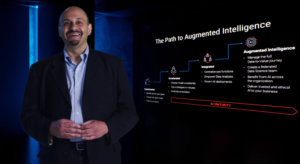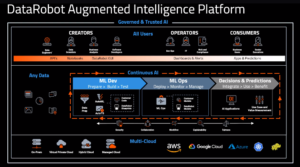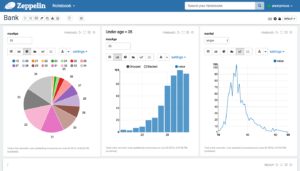

(Phonlamai-Photo/Shutterstock)
DataRobot unveiled several enhancements in its automated machine learning platform today, including the introduction of features like composable ML and continuous AI. The company, which is holding a virtual conference today and tomorrow, also bought Zepl, the data science notebook startup founded by the backers of Apache Zepplin.
During a session at DataRobot’s AI Experience Worldwide virtual conference, Nenshad Bardoliwalla, the company’s senior vice president of product, led attendees through a roundup of the company’s 2020 accomplishments, and laid out a roadmap for what DataRobot hopes to do in 2021.
“2020 was a busy year at DataRobot,” said Bardoliwalla, who joined DataRobot in late 2019 when it acquired Paxata, the data preparation company he co-founded. “Perhaps we had a little more time on keyboards, not having to commute during the pandemic.”
For starters, DataRobot completed the integration of the Paxata data prep tools, he said. It also rounded out its end-to-end data pipelines to support model training, inference, and continouous improvement, Bardoliwalla said.
“We enhanced AutoML significantly with the addition of visual AI to automate and democratize computer vision models, location AI to add geospatial awareness, and automated deep learning to help you try new approaches on your tabular text and your image data,” he told the audience. “We also added automatic feature discovery to automate the laborious and repetitive feature engineering activities from multiple related datasets into a single operation.”

DataRobot is on the path to delivering “augmented intelligence,” SVP of Product Nenshad Bardoliwalla said during today’s virtual conference
2020 also saw DataRobot bolster its time-series capabilities with automated anomaly detection; add support for Keras deep learning libraries; roll out new MLOps agents to support remote models; add a champion-challenger framework to stress-test ML models; introduce an application gallery; and roll out a value tracker for AI.
“I believe we set the bar high for innovation,” Bardoliwalla said. “And now we plan to surpass it.”
The company already rolled out its first new release in March with the launch of DataRobot version 7.0. That release brought enhancements in MLOps, model baseline comparison, computer vision, and data prep.
With today’s announcement, the company is once again bolstering capabilities across its expansive AI platform, including the introduction of what the company is calling “composable ML,” which Bardoliwalla called “another first in the field of data science and machine learning.”
Composable ML is a feature for the most advanced “code-first” data scientists that gives them more capabilities to tweak and tune their ML models, Bardoliwalla said.
“You’ll be able to copy, edit, and even reconfigure DataRobot’s blueprints to fit the specific needs of your use case and the best practices unique to your business,” he told the audience in today’s session. “Within any DataRobot blueprint, you’ll be able to integrate your own Python and R code to add new custom tabs into our model. You can even bring your own training models built from scratch by your best data scientists and run them in our head-to-head model competition. Once you see how they place on our leaderboard, you can decide which model” to use.
Meanwhile, the new “Continuous AI” feature is designed to bolster the DataRobot MLOps product to fine-tune the retraining policies for machine learning models.
“You will now be able to set automatic retraining policies for your production models based on a schedule of your choosing, or on the occurrence of a significant event, such as the detection of data drift or a dip in model accuracy,” Bardoliwalla said.
Continuous AI will leverage DataRobot’s champion-challenger framework to analyze the performance of production models and recommend when the model should be replaced. It’s all about automating the tasks that are mostly done manually by data science practitioners today, Bardoliwalla said.
“Just imagine how much time and energy you could have saved this time last year when Covid made everyone’s models inaccurate, forcing lengthy re-training and replacement projects,” he said. “Now your modes will stay accurate for as a long as they live in your production environment, no matter what crazy thing is going on across the world.”
This release also brings a new bias and fairness tool that monitors for disparate impacts by ML models. DataRobot has been at the forefront of tackling the bias concerns in AI, having produced the “State of AI Bias” report in 2019, and hiring a new Global AI Ethicist, Haniyeh Mahmoudian, three weeks ago. It also released a model grader, which is a new tool to evaluate existing AI models and generate an automatic scorecard grading them across data auality, robustness, accuracy, and fairness.
The company also debuted its no code AI app builder for practitioners who don’t want to write code in Python or R. The software presents a GUI that allows users to build ML models in a drag-and-drop fashion using widgets and pre-built templates.
Finally, DataRobot acquired Zepl, the Silicon Valley firm behind the open source Apache Zeppelin data science notebook. Zepl, which had raised $13.1 million, owns a cloud product that allows users to analyze data and develop ML models in the interactive Zepplin environment. The offering, which emerged from beta in 2018, works with multiple languages and production environments, including Apache Spark environments, such as Databricks’.
DataRobot says it will integrate Zepl as “a cloud-native, self-service notebook” in its AI environment. In addition to enabling users to build models in a notebook environment (similar to Jupyter), they’ll be able to collaborate with other data scientists using Zepl’s integration with DataRobot, the company says.
“We have always known that to lead the AI market, we must embrace all creators of AI systems, from analysts and citizen data scientists who prefer using a GUI to advanced data scientists who love to code,” said Dan Wright, who took over the CEO seat at DataRobot in March following the departure of co-founder Jeremy Achin.
“Through the addition of Zepl, we now give advanced data scientists more flexibility to use our enterprise AI platform within their existing workflows, including the ability to use their own code. By incorporating Zepl into the DataRobot platform, we plan to further democratize data science across every enterprise and significantly accelerate our code-centric roadmap,” he says.
The company’s AI Experience Worldwide continues tomorrow at https://aiworldwide.datarobot.com.
Related Items:
DataRobot Introduces AI-Powered Anti-Pandemic Initiative ‘ContagionNET’
DataRobot Eyes IPO After Another VC Haul
Apache Zeppelin Launches Latest Data Science Notebook
June 13, 2025
- PuppyGraph Announces New Native Integration to Support Databricks’ Managed Iceberg Tables
- Striim Announces Neon Serverless Postgres Support
- AMD Advances Open AI Vision with New GPUs, Developer Cloud and Ecosystem Growth
- Databricks Launches Agent Bricks: A New Approach to Building AI Agents
- Basecamp Research Identifies Over 1M New Species to Power Generative Biology
- Informatica Expands Partnership with Databricks as Launch Partner for Managed Iceberg Tables and OLTP Database
- Thales Launches File Activity Monitoring to Strengthen Real-Time Visibility and Control Over Unstructured Data
- Sumo Logic’s New Report Reveals Security Leaders Are Prioritizing AI in New Solutions
June 12, 2025
- Databricks Expands Google Cloud Partnership to Offer Native Access to Gemini AI Models
- Zilliz Releases Milvus 2.6 with Tiered Storage and Int8 Compression to Cut Vector Search Costs
- Databricks and Microsoft Extend Strategic Partnership for Azure Databricks
- ThoughtSpot Unveils DataSpot to Accelerate Agentic Analytics for Every Databricks Customer
- Databricks Eliminates Table Format Lock-in and Adds Capabilities for Business Users with Unity Catalog Advancements
- OpsGuru Signs Strategic Collaboration Agreement with AWS and Expands Services to US
- Databricks Unveils Databricks One: A New Way to Bring AI to Every Corner of the Business
- MinIO Expands Partner Program to Meet AIStor Demand
- Databricks Donates Declarative Pipelines to Apache Spark Open Source Project
June 11, 2025
- What Are Reasoning Models and Why You Should Care
- The GDPR: An Artificial Intelligence Killer?
- Fine-Tuning LLM Performance: How Knowledge Graphs Can Help Avoid Missteps
- It’s Snowflake Vs. Databricks in Dueling Big Data Conferences
- Snowflake Widens Analytics and AI Reach at Summit 25
- Top-Down or Bottom-Up Data Model Design: Which is Best?
- Why Snowflake Bought Crunchy Data
- Change to Apache Iceberg Could Streamline Queries, Open Data
- Inside the Chargeback System That Made Harvard’s Storage Sustainable
- dbt Labs Cranks the Performance Dial with New Fusion Engine
- More Features…
- Mathematica Helps Crack Zodiac Killer’s Code
- It’s Official: Informatica Agrees to Be Bought by Salesforce for $8 Billion
- AI Agents To Drive Scientific Discovery Within a Year, Altman Predicts
- Solidigm Celebrates World’s Largest SSD with ‘122 Day’
- DuckLake Makes a Splash in the Lakehouse Stack – But Can It Break Through?
- The Top Five Data Labeling Firms According to Everest Group
- Who Is AI Inference Pipeline Builder Chalk?
- ‘The Relational Model Always Wins,’ RelationalAI CEO Says
- IBM to Buy DataStax for Database, GenAI Capabilities
- VAST Says It’s Built an Operating System for AI
- More News In Brief…
- Astronomer Unveils New Capabilities in Astro to Streamline Enterprise Data Orchestration
- Yandex Releases World’s Largest Event Dataset for Advancing Recommender Systems
- Astronomer Introduces Astro Observe to Provide Unified Full-Stack Data Orchestration and Observability
- BigID Reports Majority of Enterprises Lack AI Risk Visibility in 2025
- Databricks Announces Data Intelligence Platform for Communications
- MariaDB Expands Enterprise Platform with Galera Cluster Acquisition
- Snowflake Openflow Unlocks Full Data Interoperability, Accelerating Data Movement for AI Innovation
- Databricks Unveils Databricks One: A New Way to Bring AI to Every Corner of the Business
- Gartner Predicts 40% of Generative AI Solutions Will Be Multimodal By 2027
- Databricks Announces 2025 Data + AI Summit Keynote Lineup and Data Intelligence Programming
- More This Just In…




























